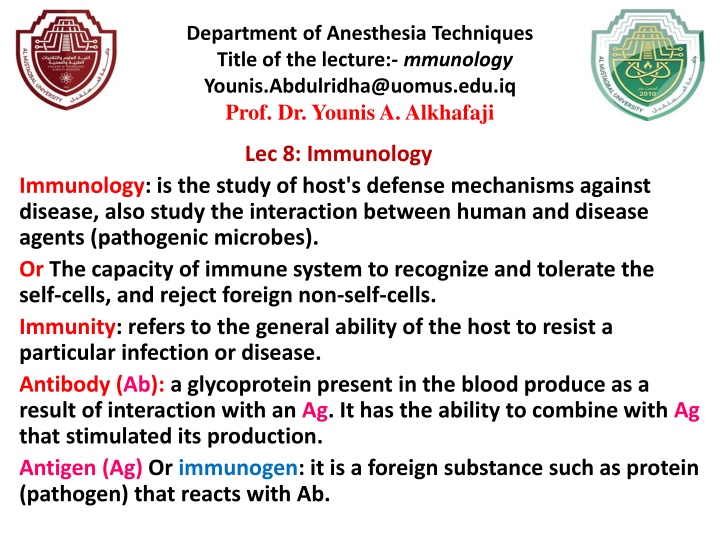
Immunology - Host Defense Mechanisms and Immune System Function
Explore the fascinating field of immunology, focusing on the host's defense mechanisms against diseases and the interaction with pathogenic microbes. Learn about the immune system's ability to distinguish between self and non-self antigens, protect the body, and defend against infections. Discover the differences between innate and adaptive immunity, including their responses, inheritance, and compositions. Delve into the immune response starting with the innate system and transitioning to the adaptive system, highlighting the hematopoietic precursor and cell origins.
Uploaded on | 3 Views
Download Presentation

Please find below an Image/Link to download the presentation.
The content on the website is provided AS IS for your information and personal use only. It may not be sold, licensed, or shared on other websites without obtaining consent from the author. If you encounter any issues during the download, it is possible that the publisher has removed the file from their server.
You are allowed to download the files provided on this website for personal or commercial use, subject to the condition that they are used lawfully. All files are the property of their respective owners.
The content on the website is provided AS IS for your information and personal use only. It may not be sold, licensed, or shared on other websites without obtaining consent from the author.
E N D
Presentation Transcript
Department of Anesthesia Techniques Title of the lecture:- mmunology Younis.Abdulridha@uomus.edu.iq Prof. Dr. Younis A. Alkhafaji Lec 8: Immunology Immunology: is the study of host's defense mechanisms against disease, also study the interaction between human and disease agents (pathogenic microbes). Or The capacity of immune system to recognize and tolerate the self-cells, and reject foreign non-self-cells. Immunity: refers to the general ability of the host to resist a particular infection or disease. Antibody (Ab): a glycoprotein present in the blood produce as a result of interaction with an Ag. It has the ability to combine with Ag that stimulated its production. Antigen (Ag) Or immunogen: it is a foreign substance such as protein (pathogen) that reacts with Ab.
Department of Anesthesia Techniques Title of the lecture:- Immunology Younis.Abdulridha@uomus.edu.iq Prof. Dr. Younis A. Alkhafaji Function of Immune system 1- Distinguish between self and non self antigen 2- Protect the body and defense against infection and disease
Difference between Innate and Adaptive Immunity S.N. Object Innate immunity Adaptive immunity Innate immunity is something already present in the body Adaptive immunity is created in response to exposure to a foreign substance. 1 Presence 2 Specificity Non-Specific Specific 3 Response Fights any foreign invader Fight only specific infection 4 Response Rapid Slow (1-2 weeks) Adaptive immunity, is not passed from the parents, hence it cannot be inherited. 5 Inheritance Innate immunity is generally inherited from parents. 6 Memory No memory Long term memory 7 Presence Present at birth Develops during a person s lifetime. Microbes and non-microbial substances called antigens 8 Used Against For microbes 9 Diversity Limited High 10 Speed Faster response Slower response The innate immune system is composed of physical and chemical barriers, phagocytic leukocytes, dendritic cells, natural killer cells, and plasma proteins Adaptive immune system is composed of B cells and T cells, Antibody 11 Composition
Department of Anesthesia Techniques Title of the lecture:- Immunology Younis.Abdulridha@uomus.edu.iq Prof. Dr. Younis A. Alkhafaji The immune response The immune response beginning with elements of the innate immune system followed by the adaptive immune system. The interrelationship of these two arms of our immune system is hematopoietic precursor, stem cell. Cells of the innate immune system derive from myeloid precursors whereas cells associated with the adaptive immune system are derived from common lymphoid precursors
Department of Anesthesia Techniques Title of the lecture:- Immunology Younis.Abdulridha@uomus.edu.iq Prof. Dr. Younis A. Alkhafaji Innate (non specific) immunity A-Non specific innate defenses The body has a number of built in defense mechanisms, which provide protection against a wide range of pathogens , it is includes general mechanisms inherited as part of innate structure and act as a first line of defenses called non - specific innate defenses . Mechanism of Innate Immunity 1- Anatomic or physical (skin, mucous membranes ,Waxes in ears) 2- Physiologic or chemical (temperature, pH, lysozyme, complement, and some interferons) 3- Biological factors: include the normal flora of the (skin, GIT) can prevent the colonization of pathogenic microbes by secreting toxic substances or by competing with pathogens for nutrient or attachment to host cells. 4- Phagocytic (monocytes, neutrophils, macrophages) 5- Inflammatory and fever action
Innate immune cells include: a- Neutrophils b- Natural killer cell c- Macrophage d- Eosinophils
Department of Anesthesia Techniques Title of the lecture:- Immunology Younis.Abdulridha@uomus.edu.iq Prof. Dr. Younis A. Alkhafaji Adaptive Immune System Classification of acquired or adaptive (specific) immunity according to the nature of components of immune mediated reactions: A- Humoral immunity (HI): mediated by specific glycoproteins (immunoglobulins or Ab), which are B-lymphocytes. B- Cell mediated immunity (CMI): mediated by specific cells, which are T lymphocytes. Adaptive immune cells include: The cells involved in this type of immunity are lymphocytes both T and B cells. 1- B-lymphocytes: it recognizes antigens and develop into antibody- secreting cells( Plasma cell) IgG, IgM, IgA, IgE, IgD.
Department of Anesthesia Techniques Title of the lecture:- Immunology Younis.Abdulridha@uomus.edu.iq 2- T-lymphocytes a- Helper T lymphocytes recognize antigens on the surfaces of antigen presenting cells and secrete cytokines, which stimulate different mechanisms of immunity and inflammation. b- Cytotoxic T lymphocytes recognize antigens on infected cells and kill these cells. c- Regulatory T cells suppress and prevent immune responses (e.g., to self antigens.
Department of Anesthesia Techniques Title of the lecture:- Immunology Younis.Abdulridha@uomus.edu.iq Prof. Dr. Younis A. Alkhafaji

















